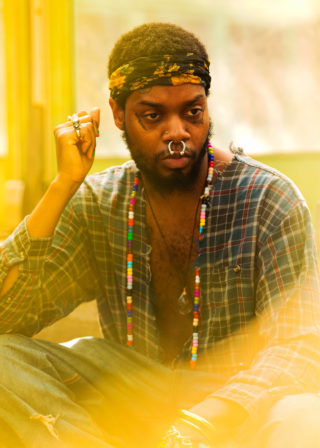Serpentwithfeet
DEACON
8/10

8/10
Josiah Wise had already lived a litany of musical lives before his thirtieth birthday. His childhood involved stints in choirs, first singing classically in the Maryland State Boys Choir, which he found lacking in racial diversity, and then in the choral group at Baltimore City College, in which Black people were far better represented, and with which he went overseas to compete at an international level. The experience sufficiently turned his head to have him, as a teenager, dedicating himself to the dream of becoming a world-class classical performer: rehearsing for hours on end every day, taking lessons in opera singing, and learning French, German and Italian in anticipation of a career that would have him performing arias from across the global songbook.
It didn’t materialise. A series of make-or-break applications to graduate programmes were rejected, at what we now know to be a turning point; the moment at which he began to become serpentwithfeet. This was a transformation every bit as physical as musical, as spiritual as sonic. Shorn of the need to pay any heed to the clean-cut conventions of the classical world, he adopted a look that would become his signature, one dominated by an oversized septum piercing and a host of body inkings that, in just about as dramatic a break with his Pentecostal upbringing as possible, included one of a pentagram on the side of his head.
He performed similar 180-degree turns in swapping Baltimore for Brooklyn, and in exploring his own queerness. All the while, he was quietly figuring out how to subvert a musical language that he had spent years mastering, only to be told he wasn’t fluent enough for the white classical world to find space for him. He dug deep, studied intently, worked out just how deeply rooted the history of classical in the United States was in the music of his African-American ancestors. He reflected on his own stylistic journey, ruminating on where the neo-soul groups of his college days and his occasional predilection for the gothic could fit in the songs he wrote moving forward.
All of which laid the groundwork for what would be a fascinating series of clashes in his early work – between his cerebral, highly academic understanding of classical and the primal nature of the gospel music of his youth, and in his suffusion of centuries-old sonic sensibilities with a lyrical outlook shaped by his experiences as a queer man in present-day America. His enlisting of The Haxan Cloak as his key collaborator on debut EP blisters was no accident; by selecting somebody at the cutting-edge of 21st century electronica he was hiring a sort of futuristic spirit guide who could make sense of Wise’s fundamental push-and-pull between the ancient and the contemporary.
blisters was the sound of him working out these contradictions in real time. A quick-fire twenty-one-minute five-tracker that was so much more expansive than the running time suggested, it was ultimately held together not by the production, not by Wise’s scholarly background and not by the myriad influences being thrown into the pot, but by the literal and figurative power of his voice. His pairing of classical inflections with modern effects felt like a genuine breaking of the vocal mould, whilst his conversational approach to storytelling fizzed with wit and glowed with warmth. It played like proof positive that none of the many different hats he’d tried on over the years were ever going to properly accommodate somebody so idiosyncratic –for him to express himself faithfully, he’d need to work in his own image, to his own design.

This is something reflected in his position on the outskirts of the mainstream; still a little too weird to command the broad appeal of Frank Ocean, too committed to experimentalism – and even in the era of Ocean and Lil Nas X, perhaps too unapologetically queer – to have a crossover hit. His last album, soil, set down a marker in terms of how intrinsically tied it was to the idea of his ancestry, as well as to his ever-developing relationship with his faith. It was also an album defined by its complexity, taking a nuanced look at the messy intricacies of relationships as well as layering his vocals in a manner that often had him sounding like a choir unto himself.
This follow-up, DEACON, feels like an attempt to offer up a more potent distillation of what makes Wise tick, both emotionally and as a musician, whilst recognising that (like the rest of us) he remains a work-in-progress on both fronts. In a further indicator of his ongoing connection with his religious upbringing, it’s named after the position in some branches of the Christian church below that of a priest but above that of a layperson, often acting as a conduit between the two. In an abstract sense, Wise embodies that role throughout: like soil, DEACON is a treatise on queer love and interpersonal relationships; but unlike soil, it seeks less to counsel on the awkward aspects of them, with the deliberate exclusion of any songs that reference heartbreak. Instead, there’s more focus on the little things; it’s as if he’s realised that the biggest political statements can be the simplest. That’s why the gorgeously simple ‘Same Size Shoe’ packs such an emotional punch – it’s a handsomely woozy love song that inflects R&B with dream pop, built around the plainest of observations: “Me and my boo wear the same size shoe.” Lead single ‘Fellowship’, meanwhile, is a clear-eyed paean to the profundity of male friendship, on which he fittingly brings in Sampha and Lil Silva to back him.
In general, the compositions here are by a distance the lightest and airiest that Wise has yet put forward. Where soil occasionally threatened to overcook things with perhaps one too many ideas shoehorned in, the musical themes on DEACON are given ample room to breathe. Combined with cleaner, more restrained vocals and a stepped-down tempo, it means the record – only thirty minutes in length – floats by gorgeously, although repeat listens reveal the songs to be plenty elaborate beneath the surface.
With only three features on the album, Wise often approaches the tracks as if determined to accompany himself. The way the pace subtly shifts throughout the hazy ‘Amir’ is a case in point, as is the softly uptempo ‘Sailor’s Superstition’. For an artist whose identity has been so informed by environmental factors – his education, his sexuality, his faith – this is the first release of Wise’s to be heavily imbued with a sense of place – Los Angeles, where he moved around the time the songs began to come together. You can see the palm trees and feel the warmth of the sun with this collection – the change of pace from Brooklyn
is palpable.
Elsewhere, there remains room for the skilful pushing of Wise’s own boundaries. Opener ‘Hyacinth’ might be the standout, weaving an impressionistic backdrop out of melodic, chiming guitar and deep, throbbing bass over which he smartly pieces together another multi-part vocal, effectively duetting with himself as he spins an affecting love story. Comparisons to Ocean have been made readily in the past, but had ‘Hyacinth’ made it onto Blonde instead, you never would’ve heard the end of it. On ‘Heart Storm’, NAO less guests than takes the stage Wise graciously sets for her; the cautious optimism of ‘Old & Fine’, meanwhile, might be the record’s most affecting moment.
That track also plays like DEACON in microcosm – this is an album of quiet ambition, one that treads softly in both sound and message. Its minimalism sets it well apart from both blisters and soil, but the spirit of self-discovery remains the same. There’s almost an irony to the fact that, both personally and musically, such a complex character with such a wealth of ability and knowledge seems to have expressed himself most succinctly by stripping away the accoutrements. He has made what is, at its heart, a genuine soul record.